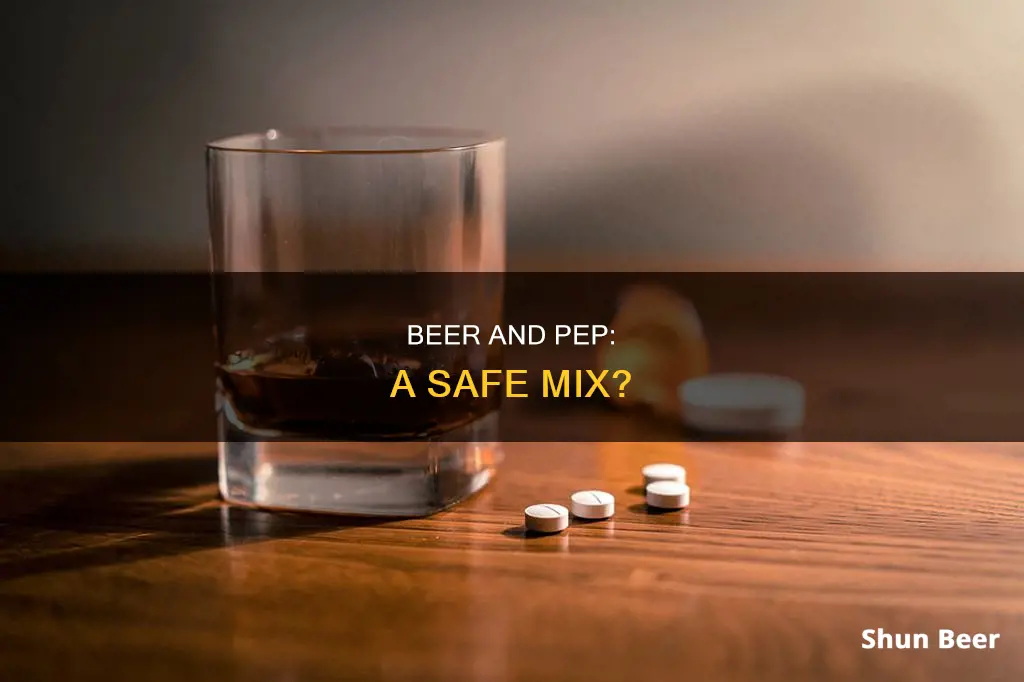
Drinking alcohol while on PEP (Post-Exposure Prophylaxis) medication is not recommended due to potential liver damage, as alcohol is processed in the liver and all PEP drugs can cause liver damage. However, alcohol does not reduce the effectiveness of PEP, and moderate alcohol intake does not increase or decrease PEP's protection. It is advised to avoid binge drinking while on PEP medication to reduce the risk of liver damage. It is always best to consult with a medical professional to determine the most suitable course of action based on individual risk factors.
| Characteristics | Values |
|---|---|
| Will drinking beer reduce PEP's effectiveness? | No, alcohol does not reduce PEP's effectiveness. |
| Is it recommended to drink beer while on PEP? | It is advised against drinking beer while on PEP. |
| Can drinking beer while on PEP be harmful? | Yes, drinking beer while on PEP can be harmful to the liver. |
What You'll Learn
- PEP does not become less effective if you drink alcohol while taking it
- Alcohol can cause you to forget to take PEP, which reduces its effectiveness
- PEP is a combination of drugs that prevent the replication of the HIV virus
- PEP is not a cure, but it halts viral replication
- PEP can cause side effects such as redistribution of body fat and irregular heartbeat

PEP does not become less effective if you drink alcohol while taking it
PEP, or post-exposure prophylaxis, is a combination of drugs that prevent the replication of the HIV virus, giving your body time to clear it. It is important to note that PEP does not kill the virus but inhibits it, which is why it is vital to take the full 28-day course as prescribed.
While on PEP, it is generally advised to avoid alcohol, as it is processed in the liver, and all PEP drugs can cause liver damage. However, this does not mean that alcohol will reduce the effectiveness of PEP. As long as alcohol does not cause you to forget to take your PEP medication at the same time each day, it will not interfere with the activity of the drug or make PEP less effective.
That being said, it is always best to consult with a medical professional who knows your individual risk factors and can provide personalized advice. They can guide you on whether it is safe to consume alcohol while on PEP and address any concerns or questions you may have.
Additionally, it is important to remember that PEP is not a cure for HIV. Even while on PEP, it is crucial to practice safe sex and avoid unprotected sexual intercourse, as live HIV virus may still be present in your blood and body fluids.
Beer and Chardonnay: A Match Made in Heaven?
You may want to see also

Alcohol can cause you to forget to take PEP, which reduces its effectiveness
Alcohol does not affect the effectiveness of PEP directly. However, it can lead to forgetfulness, causing individuals to skip their PEP medication. This reduces the effectiveness of PEP as a course. Therefore, it is advisable to avoid alcohol during the 28-day PEP regimen to ensure medication adherence.
Alcohol can disrupt memory, attention, and sleep, which may lead to unintentional non-adherence to the PEP regimen. Additionally, some individuals may intentionally forego taking PEP medication while drinking due to beliefs about the potential harm of mixing alcohol and pharmaceuticals. These beliefs about interactive toxicity may further discourage individuals from starting or adhering to the PEP regimen.
While moderate alcohol intake does not seem to impact PEP's protection, it is still recommended to consult a medical professional who can provide advice based on individual risk factors. It is also an opportunity to reflect on alcohol consumption habits and consider whether a break or reduction in alcohol use is needed.
Kayaking and Beer: What's Legal in Virginia?
You may want to see also

PEP is a combination of drugs that prevent the replication of the HIV virus
Post-exposure prophylaxis (PEP) is a combination of antiretroviral medications that prevent the replication of the HIV virus by stopping it from copying itself and settling in the body. It is taken after potential exposure to HIV to lower the chance of infection. It is important to start PEP within 72 hours of possible exposure, and it must be taken every day for 28 days for it to be effective. PEP is not a substitute for safe sex or new sterile needles and is meant only for emergency situations.
While on PEP, it is safe to consume alcohol, as it does not reduce the drug's effectiveness. However, some people may find that alcohol causes them to forget to take their PEP medication, which can reduce its effectiveness. It is important to take all doses as prescribed to give PEP the best chance of working.
If you think you have been exposed to HIV, seek medical attention immediately. PEP is not meant for long-term protection, and it is important to start treatment as soon as possible.
The Aging Beer Mystery: How Does it Work?
You may want to see also

PEP is not a cure, but it halts viral replication
PEP, or post-exposure prophylaxis, is a combination of drugs that prevent the replication of the HIV virus, giving the body enough time to clear it. It is not a cure, but it does stop the virus from replicating and lowers the chances of an integration event.
PEP uses a three-pronged attack, aiming at elements of the virus essential for replication and that do not match processes used in human cells. The drugs attack the virus but do not interfere with essential cell processes. It has three groups of drugs: a protease inhibitor, a reverse transcriptase inhibitor, and a nucleoside reverse transcriptase inhibitor. The reverse transcriptase inhibitor binds directly to the viral reverse transcriptase, preventing it from acting and stopping viral replication. The nucleoside reverse transcriptase inhibitor is a defective deoxyribose sugar that lacks the OH- group on the 3' end, preventing any deoxyribose sugar from being added to the DNA strand and stopping transcription. The protease inhibitor blocks the viral protease that cuts the pre-peptide, preventing the formation of functional virus particles.
Together, these three elements effectively halt viral replication long enough for the body to clear the infection. PEP has been shown to clear the HIV system in more than 70% of cases. It halts viral replication and decreases the chances of an integration event, but it will not undo any integration that has already occurred. These events are rare and only occur in untreated HIV cases due to the high number of viruses and the time the body is exposed. The drugs can stop viral replication long enough for the immune system to recover and clear the virus.
While PEP is not a cure, it is a powerful tool to stop HIV replication and give the body a chance to fight the infection. It is important to follow up after the PEP course to ensure the virus has been cleared, as sometimes, an early recombination event can occur, and the virus cannot be cleared.
Regarding alcohol consumption during PEP treatment, there are some conflicting opinions. Some sources advise against drinking alcohol during PEP treatment because all the PEP drugs can cause liver damage, and alcohol is also processed in the liver. However, others state that moderate alcohol intake does not affect PEP's protection, as long as it does not cause the patient to forget to take their PEP medication. It is always best to consult a medical professional for individual advice.
Viagra and Beer: A Safe Mix?
You may want to see also

PEP can cause side effects such as redistribution of body fat and irregular heartbeat
PEP, or post-exposure prophylaxis, is a method of preventing HIV infection. It involves taking a four-week course of anti-HIV drugs very soon after a person may have been exposed to the virus. The British Association for Sexual Health and HIV (BASHH) recommends using a combination of emtricitabine and tenofovir (Truvada) and raltegravir (Isentress). While PEP is generally well-tolerated, it can cause side effects such as redistribution of body fat and irregular heartbeat.
Redistribution of Body Fat
According to the National Library of Medicine, many widely used drugs can cause weight gain and redistribution of body fat. Redistribution of body fat is a common side effect of antiretroviral therapy, which is used to treat HIV. This can result in lipoatrophy, or loss of subcutaneous fat in the limbs and face, and lipohypertrophy, or central or truncal fat accumulation. While the exact mechanism is not fully understood, it is believed that antiretroviral drugs interfere with adipocyte maturation and differentiation, leading to increased triglyceride esterification and central fat accumulation. This can result in insulin resistance and an increased risk of metabolic syndrome, type 2 diabetes, and cardiovascular disease.
Irregular Heartbeat
PEP can also cause irregular heartbeat or arrhythmia. This is a potential side effect of raltegravir, one of the recommended drugs for PEP. Raltegravir may cause dizziness and vertigo, which can be signs of an irregular heartbeat. Additionally, raltegravir can lead to an increase in heart rate and palpitations in some individuals.
It is important to note that the side effects of PEP are usually short-term and often lessen or go away completely after a few days or weeks. If you are experiencing any side effects from PEP, it is important to consult your doctor or healthcare provider for advice and support.
Beer Drop: How Does the Subscription Work?
You may want to see also
Frequently asked questions
Alcohol does not reduce the effectiveness of PEP, but it is still advised that you refrain from drinking beer or any other form of alcohol during the 28-day course. This is because all PEP drugs can cause liver damage and alcohol is also processed in the liver.
Alcohol will not interfere with the activity of PEP drugs and having half a glass on a special occasion is unlikely to cause any harm. However, it is still best to avoid drinking, including binge drinking, as it can increase the severity of side effects.
Common side effects of PEP include redistribution of body fat from the limbs to the torso, development of a buffalo hump, and irregular heartbeats.
Liver damage and kidney dysfunction are possible serious side effects of PEP. If you experience jaundice, dark urine, loss of appetite, or changes to your toilet habits, speak to your doctor immediately.
If you forget to take a dose of PEP, take it as soon as you remember unless you are within four hours of your next dose. Do not take a double dose as it will not improve the effectiveness of the drug but may increase the severity of side effects.







